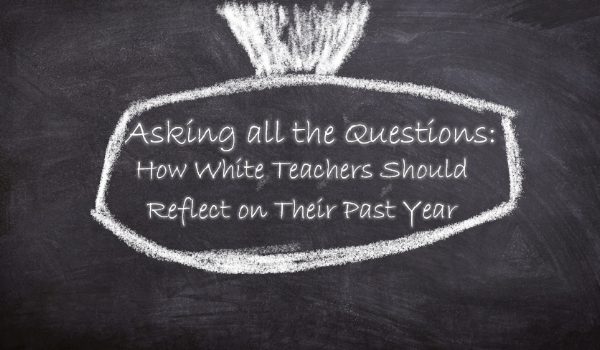Asking all the Questions: How White Teachers Should Evaluate Their Year
The end of the school year naturally leads to reflection and evaluation. Teachers and students alike are asking themselves, How did the year go? The answer to that question depends on what questions are asked prior. For example, were the students safe in my school and classroom? Do students understand the world better? Did students deepen their knowledge of self? Did students become better readers, problem solvers, and thinkers?
All of these questions matter. ALL of these questions matter.
Too often, teachers, myself included, will fail to truly engage, or even fail to ask, all of the essential questions that truthfully show us how the year went. What’s worse, we tend to position the questions in opposition to one another. We say things like “the students were safe,” or “students felt welcomed in my class” as a way to excuse the fact that they are no better at reading, problem-solving, or thinking. That they are no better equipped to maneuver a hostile world. This is the insidious nature of white liberalism. It is the epitome of what is often referred to as the “soft bigotry of low expectations.” Ironically, this line of thought frames racism and other forms of oppression as the result of individual thoughts and feelings as opposed to the intended outcomes of systems. This provides the space for white teachers (who make up 82% of the workforce) to maintain a superficial commitment to equity while guaranteeing their students never gain the necessary skills or know how to make meaningful and lasting change. Lisa Delpit discusses this at length:
“Students need technical skills to open doors, but they need to be able to think critically and creatively to participate in meaningful and potentially liberating work inside those doors. Let there be no doubt: a ‘skilled’ minority person who is not also capable of critical analysis becomes the trainable, low-level functionary of the dominant society, simply the grease that keeps the institutions which orchestrate his or her oppression running smoothly. On the other hand, a critical thinker who lacks the ‘skills’ demanded by employers and institutions of higher learning can aspire to financial and social status only within the disenfranchised underworld. Yes, if minority people are to effect the change which will allow them to truly progress we must insist on ‘skills’ within the context of critical and creative thinking.”
The reality is far too many of us teachers are reflecting on our year and doing our best to convince ourselves we are doing something to upset the status quo when in actuality we are further entrenching it. If we, as white teachers, truly want to be a force for change and interrupt systems of oppression then we must honestly reflect on ALL the questions. It’s not enough for our students to just “feel welcome,” or to have made “gains in reading.” Our students must experience gains AND feel welcome. Our students must be able to name the world, and they must be equipped to take action to change it. Teaching cannot be about us and our feel-good moments. We need to have the courage and tenacity to accept the responsibility of our position as educators with white skin who are committed to change and be more than “the cool” or “chill” teacher. We need to get results. We need results if we are to realize a world where we (white educators) do not make up 82% of teachers. We need results to realize a country where more than 4% of Fortune 500 CEOs are people of color. We need results to realize a political system with more than three black senators.
Ian McLaughlin & Ryan Williams-Virden
